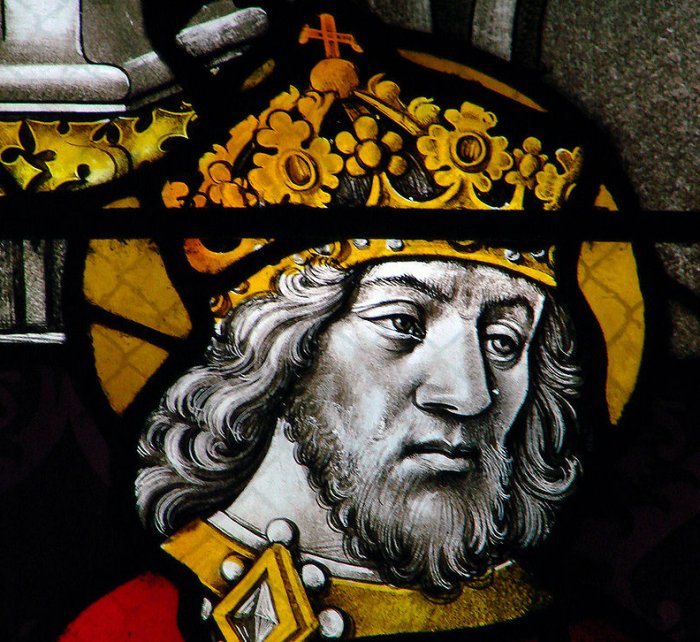Charlemagne – Most Famous Emperor Of Education And Enemy Of Pagan Worshippers – What Did He Really Mean For Europe?
A. Sutherland - AncientPages.com - Charlemagne, also known as Charles the Great (742 - 814), is considered the most remarkable of all medieval rulers in the history of the European continent.
His kingdom stretched to the territories today, including France, Germany, Benelux, part of Italy, and Switzerland; his contemporaries called him the 'Father of Europe.'
For some, he was a national hero. For others, he was the almost semi-legendary figure, and after his death - in a way - he was still alive. His life was remembered, and his achievements inspired the Crusades and later European leaders such as Louis XIV, Napoleon I, and Hitler. Even today, some people claim Charlemagne as the founder of European unity.
Charlemagne proved to be a talented diplomat and able administrator of the vast European kingdom he controlled. He was a true enemy of pagan worshippers.
Charlemagne was an enthusiastic promoter of literacy, respected education, and loved books. An excellent scholar in many other subjects, including language and mathematics, unfortunately, he never learned to write.
Charlemagne was born around 742, but his birthplace is unknown, although Aachen in modern-day Germany and Liege in present-day Belgium were proposed as possible locations.
Very little is known about his childhood. He was illiterate for much of his life. He studied grammar, rhetoric, and mathematics and learned to speak Latin and understand some Greek in addition to his native Frankish, but he had difficulties to learn to write.
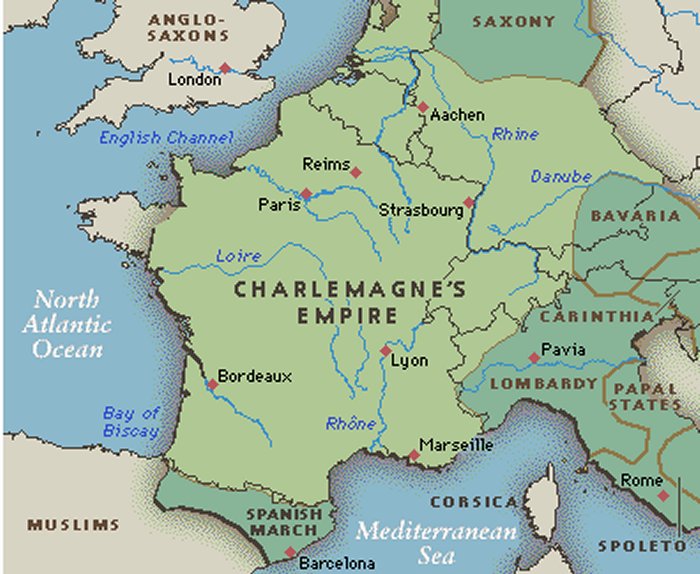
Charlemagne was a successful conqueror. He defeated the Lombards in northern Italy and made himself their king. He campaigned in Spain and Hungary.
He hired learned men to read out loud to him at dinner. We know from ancient historical records that he practiced writing on his wax tablets while in bed and then hid them under his pillows.
When his father, Pepin the Short (714 – 768), died, the kingdom was divided between Charlemagne and his brother Carloman. When his brother died in 771, Charlemagne became the leader of the reunified Frankish empire, which ruled from several cities and was engaged in many military battles during his reign.
He conquered Saxony in the 8th century, but winning the battle over the Saxons was not easy. He spread Christianity into Northern Europe by forcing Catholicism on the conquered people and slaughtering those who refused to convert. Charlemagne financially supported churches and protected the popes. He also made churches function as refugee shelters.
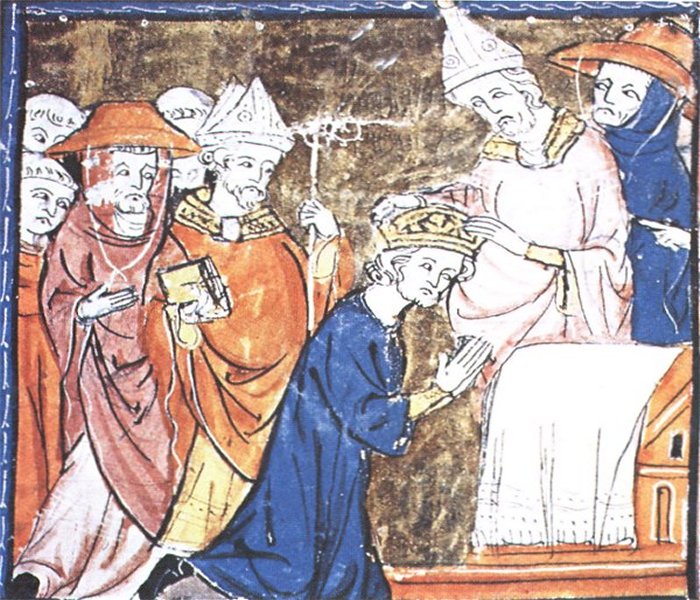
The coronation of Charlemagne by Pope Leo III. source
Pope Leo III acknowledged Charlemagne as a ruler, and in 800, at Mass on Christmas day at St. Peter's Basilica in Rome, he was named Roman Emperor.
Interestingly, Charlemagne began to use this title much later, probably because he feared it would create dependence on the Pope.
Charlemagne made many contributions to the future of European education. He sponsored the creation of a new uniform script for copying texts, developing textbooks for teaching Latin to non-Latin speakers, and collecting Latin manuscripts. Charlemagne also promoted learning that was given a time and a place to flourish. He set up monastic schools, supported authors and artists, and devised the pounds, shillings, and pence system used during the middle ages and in Britain until the 1970s.
Among his other achievements was the creation of the "Carolingian Miniscule," an alternative to the capital letters used in the Latin text.
Charlemagne died in 814 and was buried at the cathedral in Aachen. His empire encompassed much of Western Europe at the time of his death. He left control of his kingdom to his son, Louis the Pious.
His enormous cultural legacy has survived until today.
Written by A.Sutherland - AncientPages.com Senior Staff Writer
Updated on March 14, 2023
Copyright © AncientPages.com All rights reserved. This material may not be published, broadcast, rewritten or redistributed in whole or part without the express written permission of AncientPages.com
Expand for referencesReferences:
Fried J. Charlemagne
Becher M. Charlemagne
More From Ancient Pages
-
 Mysterious Underground City In Brazil Could Re-Write Ancient History – Unexplained Artifacts And Skeletons – Part 1
Ancient Mysteries | Jan 23, 2022
Mysterious Underground City In Brazil Could Re-Write Ancient History – Unexplained Artifacts And Skeletons – Part 1
Ancient Mysteries | Jan 23, 2022 -
 Salzburg Catacombs: Early Christian Place For Secret Gatherings And Hiding From Persecution
Featured Stories | Mar 16, 2016
Salzburg Catacombs: Early Christian Place For Secret Gatherings And Hiding From Persecution
Featured Stories | Mar 16, 2016 -
 Captain James Cook’s Famed Vessel The Endeavour Possibly Discovered On The Coast Of Rhode Island
Archaeology | Feb 4, 2022
Captain James Cook’s Famed Vessel The Endeavour Possibly Discovered On The Coast Of Rhode Island
Archaeology | Feb 4, 2022 -
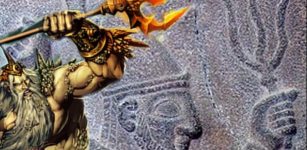 Trident: Powerful Religious Symbol Found In Many Ancient Cultures
Ancient Symbols | Dec 4, 2019
Trident: Powerful Religious Symbol Found In Many Ancient Cultures
Ancient Symbols | Dec 4, 2019 -
 Strange Ancient Measurements Of The Earth Revealed – Ancient Texts And Physical Evidence Examined
Ancient Mysteries | Apr 11, 2018
Strange Ancient Measurements Of The Earth Revealed – Ancient Texts And Physical Evidence Examined
Ancient Mysteries | Apr 11, 2018 -
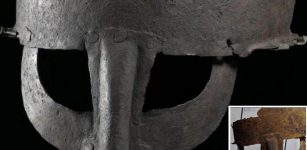 Why Is The Yarm Viking Helmet Special?
Archaeology | Aug 10, 2020
Why Is The Yarm Viking Helmet Special?
Archaeology | Aug 10, 2020 -
 Three 1850-Year-Od Stone Ossuaries Prevented From Looting Near Kafr Kanna In Galilee
Archaeology | Jun 21, 2023
Three 1850-Year-Od Stone Ossuaries Prevented From Looting Near Kafr Kanna In Galilee
Archaeology | Jun 21, 2023 -
 Shin-Au-Av – Secret Ancient Underground City Hidden Beneath Death Valley
Featured Stories | Jun 6, 2024
Shin-Au-Av – Secret Ancient Underground City Hidden Beneath Death Valley
Featured Stories | Jun 6, 2024 -
 Scientists Identify Birds On Magnificent Ancient Egyptian Artwork Found In Amarna
Archaeology | Dec 28, 2022
Scientists Identify Birds On Magnificent Ancient Egyptian Artwork Found In Amarna
Archaeology | Dec 28, 2022 -
 Mysterious Death Of 20 Celts Who Died 2,000 Years Ago In The Three Lakes, Switzerland – Re-Examined
Archaeology | Jun 17, 2024
Mysterious Death Of 20 Celts Who Died 2,000 Years Ago In The Three Lakes, Switzerland – Re-Examined
Archaeology | Jun 17, 2024 -
 On This Day In History: American Astronomer Edwin Hubble Announced Existence Of Other Galaxies – On Dec 30, 1924
News | Dec 30, 2016
On This Day In History: American Astronomer Edwin Hubble Announced Existence Of Other Galaxies – On Dec 30, 1924
News | Dec 30, 2016 -
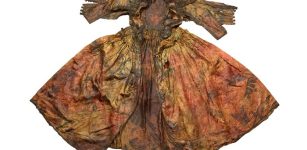 Unique 17th Century Silk Dress Found At Bottom Of The Wadden Sea Goes On Display
Artifacts | Jul 29, 2023
Unique 17th Century Silk Dress Found At Bottom Of The Wadden Sea Goes On Display
Artifacts | Jul 29, 2023 -
 Secret Dwelling Place Of Reptilian And Dragon-Like Creatures In Europe
Ancient Mysteries | Jul 18, 2018
Secret Dwelling Place Of Reptilian And Dragon-Like Creatures In Europe
Ancient Mysteries | Jul 18, 2018 -
 Ancient Treasure Hidden In Perplexing Secret Underground Labyrinth In France – Dangerous Search – Part 1
Ancient Mysteries | Jan 16, 2020
Ancient Treasure Hidden In Perplexing Secret Underground Labyrinth In France – Dangerous Search – Part 1
Ancient Mysteries | Jan 16, 2020 -
 Ancient Inscriptions Of Babylonian King Nabonidus Discovered In Saudi Arabia
Archaeology | Jul 14, 2021
Ancient Inscriptions Of Babylonian King Nabonidus Discovered In Saudi Arabia
Archaeology | Jul 14, 2021 -
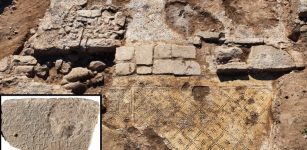 1,500-Year-Old Inscription ‘Christ, Born Of Mary’ Engraved On Magnificent Building Discovered In Israel
Archaeology | Jan 21, 2021
1,500-Year-Old Inscription ‘Christ, Born Of Mary’ Engraved On Magnificent Building Discovered In Israel
Archaeology | Jan 21, 2021 -
 Discovery Of World’s Oldest Fortresses Reshapes Our Understanding Of Hunter–Gatherers
Archaeology | Dec 7, 2023
Discovery Of World’s Oldest Fortresses Reshapes Our Understanding Of Hunter–Gatherers
Archaeology | Dec 7, 2023 -
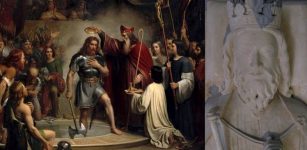 Merovingian Dynasty Of Long Haired Kings
Featured Stories | Jan 18, 2019
Merovingian Dynasty Of Long Haired Kings
Featured Stories | Jan 18, 2019 -
 Fall Equinox Explains Unusual Alignment Of Egypt’s Great Pyramids – Engineer Says
Archaeology | Feb 26, 2018
Fall Equinox Explains Unusual Alignment Of Egypt’s Great Pyramids – Engineer Says
Archaeology | Feb 26, 2018 -
 Unexplained Ancient Case Of Missing Time And Mysterious Disappearance Into An Underground World
Featured Stories | Feb 11, 2025
Unexplained Ancient Case Of Missing Time And Mysterious Disappearance Into An Underground World
Featured Stories | Feb 11, 2025

